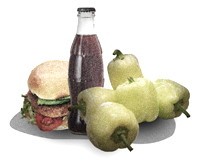Plant-based foods provide an alternative source for nutrients
A vegan diet is one which abstains from eating animal ingredients or derivatives. To raise awareness about animal ingredients in everyday foods, and to discover if it is possible to maintain a nutritious diet while eating strictly vegan, I am adopting a vegan diet for the month of September.
There are four main nutrition concerns about eating vegan: Protein, calcium, iron and vitamin B12. These nutrients are usually associated with animal ingredients. Luckily there are plant-based foods that also contain them.
Fruits and vegetables are typically viewed as carbohydrates but some of them have higher amounts of protein than others. Figs, broccoli, spinach and mustard greens are all good examples of protein-rich vegetables.
Quinoa, though often considered a grain, is actually related to leafy greens and is a complete protein. It provides all of your protein needs in one food. Sprouts are another complete protein to include daily in your diet. Beans, legumes and nuts can be eaten in combination to create complete protein meals.
Both figs and almonds are a great source of calcium as well as protein. Make your own almond milk by blending together raw almonds with water. If you like your “milk” a bit sweeter, add vanilla extract or agave nectar.
Kale and soybeans are two more good sources of calcium. The calcium in these foods is easily absorbed into the bloodstream, meaning that your body is better able to use the nutrients in the food.
Spinach is high in calcium but it unfortunately is not very well absorbed. It should not be your main source of calcium. However, spinach has many other nutrients and should therefore be a staple in everyone’s diet.
Most plant-based foods containing iron are not as absorbent as animal ingredients. For this reason, eat iron-rich foods with vitamin C-rich foods; vitamin C enhances the absorption of iron. Eat chickpeas and lentils for iron power.
Vitamin B12 is the biggest problem for vegans. It is made by bacteria, so as omnivores we get our required needs from eating animal products.
Check soy, rice or almond milk to see if these grocery store items are fortified with vitamin B12. Nutritional yeast, a flaky all-natural substance which is often used as a vegan cheese replacement in recipes, also contains vitamin B12.
Vegans should talk to a registered dietitian about whether taking a vitamin B12 supplement is right for them.
To learn more about the nutrition content in whole foods, check out The World’s Healthiest Foods at www.whfoods.org. This website profiles 129 foods for vegans, vegetarians and omnivores alike.
University of Winnipeg student Sagan Morrow writes a health and wellness blog. Check out her adventures with veganism daily at http://livinghealthyintherealworld.wordpress.com.
Published in Volume 64, Number 2 of The Uniter (September 10, 2009)








